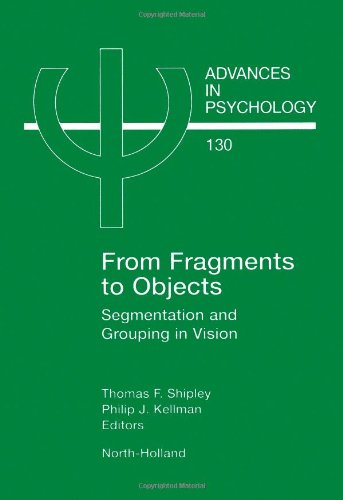

Most ebook files are in PDF format, so you can easily read them using various software such as Foxit Reader or directly on the Google Chrome browser.
Some ebook files are released by publishers in other formats such as .awz, .mobi, .epub, .fb2, etc. You may need to install specific software to read these formats on mobile/PC, such as Calibre.
Please read the tutorial at this link. https://ebooknice.com/page/post?id=faq
We offer FREE conversion to the popular formats you request; however, this may take some time. Therefore, right after payment, please email us, and we will try to provide the service as quickly as possible.
For some exceptional file formats or broken links (if any), please refrain from opening any disputes. Instead, email us first, and we will try to assist within a maximum of 6 hours.
EbookNice Team

Status:
Available5.0
39 reviews(Ebook) From Fragments to Objects Segmentation and Grouping in Vision 1st Edition by Thomas F Shipley, Philip J Kellman - Ebook PDF Instant Download/Delivery: 9780444505064 ,0444505067
Full download (Ebook) From Fragments to Objects Segmentation and Grouping in Vision 1st Edition after payment

Product details:
ISBN 10: 0444505067
ISBN 13: 9780444505064
Author: Thomas F Shipley, Philip J Kellman
"This book addresses the problem of how the human visual system organizes inputs that are fragmented in space and time into coherent, stable perceptual units - objects. In doing so it addresses the following questions: what kinds of segmentation and grouping abilities exist in human perceivers? What information and computational processes achieve segmentation and grouping? What are the psychological consequences of perceiving whole objects?" "From Fragments to Objects: Segmentation and Grouping in Vision takes a comprehensive cognitive science approach to object perception, brings together separate lines of research in object perception in one volume, gives an integrated and up-to-date review of theory and empirical research and offers directions for future study."
(Ebook) From Fragments to Objects Segmentation and Grouping in Vision 1st Edition Table of contents:
Part I: Philosophy and History of Perceptual Unit Formation
Chapter 1. The Concept of an "Object" in Perception and Cognition
Chapter 2. Balls of Wax and Cans of Worms: The Early History of Object Perception
Part II: Development
Chapter 3. Perceptual Unit Formation in Infancy
Chapter 4. Perceptual Units and Their Mapping with Language
Part III: Attention
Chapter 5. An Object Substitution Theory of Visual Masking
Chapter 6. Attention and Unit formation A Biased Competition Account of Object-Based Attention
Part IV: Models of Segmentation and Grouping
Chapter 7. Geometric and Neural Models of Object Perception
Chapter 8. Varieties of Grouping and its Role in Determining Surface Layout
Chapter 9. Amodal Completion: A Case Study in Grouping
Chapter 10. Perceptual Organization as Generic Object Recognition
Chapter 11. Simplicity, Regularity, and Perceptual Interpretations: A Structural Information Approac
Chapter 12. Computational Neural Models of Spatial integration in Perceptual Grouping
Chapter 13. Part-Based Representations of Visual Shape and Implications for Visual Cognition
Part V: Spatiotemporal Segmentation and Grouping
Chapter 14. Gaze Control for Face Learning and Recognition by Humans and Machines
Chapter 15. The Visual Interpretation of Object and Human Movement
Chapter 16. Contours From Apparent Motion: A Computational Theory
Chapter 17. Breathing Illusions and Boundary Formation in Space-Time
Chapter 18. Perception of Occluding and Occluded Objects Over Time: Spatiotemporal Segmentation and
Author Index
Subject Index
People also search for (Ebook) From Fragments to Objects Segmentation and Grouping in Vision 1st Edition:
segment fragments
a fragment sentences
identify the fragments. select all that apply
dna fragment b consists of base pairs
c segmentation fault core dumped
Tags: Thomas F Shipley, Philip J Kellman, Objects Segmentation, Grouping, Vision